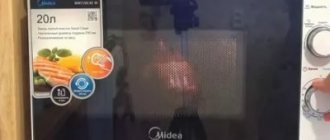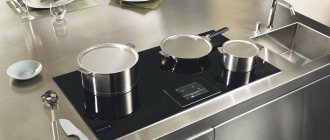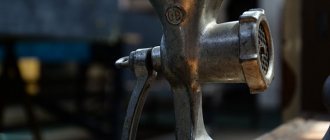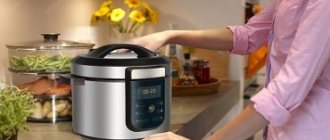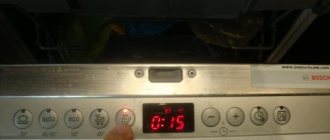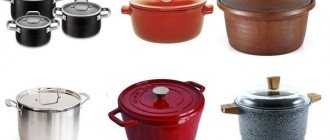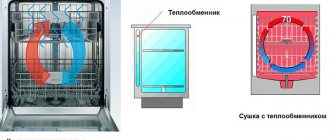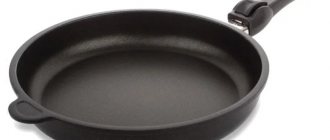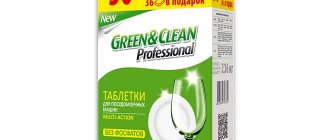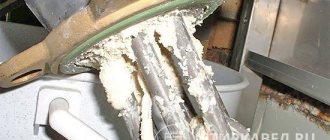When washing plates manually, gentle household chemicals are used. Using a dishwasher does not involve contact of cleaning reagents with the skin of your hands. To speed up the cycle, washing gels include more aggressive chemicals, which, when combined with high temperatures, can harm some utensil metals.
Before buying a home helper, it is useful to understand why you don’t need to wash aluminum cutlery in it, and how to restore the lost shine of something that accidentally ended up in the automatic washing machine. And also find out if there is a ban on placing items made of other materials in the dishwasher.
- Obstacles to washing aluminum cookware
- Ways to restore darkened aluminum
- Dishes prohibited for washing
- Catalog of dishwashers with reviews
Obstacles to washing aluminum cookware
To answer the question about the possibility of loading cutlery made from aluminum metal into the PMM, you need to refer to its properties. This is a chemically active element, which, when interacting with atmospheric oxygen, becomes covered with a thin oxide film, protecting the metal from further oxidation and destruction.
posuda_temruk
posuda_talko
skovorodka_magazin_posudy
vintage_starina_sssr
This circumstance, in combination with the parameters of detergents and the properties of water, allows us to make the following judgments:
- Alkali in gels. This substance is a strong solvent and easily eats away the protective oxide film on the metal surface.
- Activity of the Al element when interacting with water. The wash uses cleaners based on H2O, which reacts chemically with aluminum that has lost its protection.
- Microparticles of metal penetrating the human body. When eating food using cutlery, free aluminum molecules enter the internal organs of the person using the spoon or fork, causing them harm.
As a result, reasons are identified that allow us to state that washing kitchen utensils made of aluminum in an automatic dishwasher is contraindicated. The first argument is the darkening of the metal and its destruction. The second is the possible harm to human health.
Expert opinion
I work in the household appliance repair industry. Extensive experience in restoring washing machines and dishwashers.
Ask a Question
Adverse consequences will not appear after a single wash. But if the ban on cleaning aluminum cookware in PMM is systematically ignored, all sorts of harmful things can happen.
Why should you not wash aluminum cookware in the dishwasher?
Home » Why you can’t » Why you can’t wash aluminum dishes in a dishwasher
The dream has come true - the dishwasher is finally installed, you can start washing. Many people have a desire to wash all the dishes that are in the house, and some, without thinking, do so.
However, there is no need to rush, because putting some things in the dishwasher is strictly prohibited. First of all, this applies to all products made of aluminum.
Why exactly aluminum cookware is “afraid” of the dishwasher, let’s figure it out.
Reasons why you should not put aluminum in PMM
Aluminum is a fairly active metal that reacts with many substances and even with water, under certain conditions. Such conditions are created inside the dishwasher.
On the surface of this metal there is a dense oxide film that is easily dissolved by alkalis.
Many dishwasher detergents contain alkalis; thanks to them, dishes are washed without physical impact.
So, under the influence of alkali in hot water, the oxide film is removed from the surface of aluminum cookware. As a result of this, aluminum is able to react with water, which leads to the destruction of the aluminum itself and the appearance of a dark coating on its surface.
If you expose dishes to this effect for a long time, they will not only become dark, but will also begin to deteriorate.
Some note that after washing the dishes at 35 degrees, nothing happened at all, but we warn you again, after several such washes, the dishes will still darken, and possibly forever.
Important! Scientists have proven that aluminum cookware cannot be used. Metal enters the human body in large quantities, negatively affecting the functioning of all organs without exception.
Hand dishwashing detergents are less harsh, so we don't notice any changes with aluminum cookware. However, with prolonged use, the darkening effect still appears. So, let's conclude that aluminum cookware should not be put in the dishwasher because:
- it loses its appearance, acquiring a dark coating;
- it is not safe for health.
What to do with darkened dishes?
It’s clear why it’s forbidden to wash aluminum in the dishwasher. But not many people remember chemistry lessons, not everyone reads the instructions for dishwashers, and not all instructions contain a note that aluminum dishes cannot be washed, and some even accidentally put aluminum products in the tank. On thematic forums, users write about how they were spoiled:
- pots;
- frying pans;
- garlic presses;
- spoons;
- parts from a meat grinder.
Therefore, the question arises: is it possible to restore aluminum cookware to its former shine and attractiveness? Everything is not so simple and will depend on how much the dishes have darkened.
The protective layer of metal is not destroyed immediately; the hotter the water and the more alkali in the detergent, the faster the dishes will darken and become covered with a gray coating.
Of course, the damaged dishes should be thrown away, but sometimes this is not possible, especially if they are parts from a new meat grinder. How then can you remove plaque?
Only manual cleaning with special means will help. But boiling with soda and powder will only aggravate the situation, so under no circumstances do this.
Nitric, sulfuric and other acids can help in the fight against dark gray plaque, but we will not describe this method, since it is not safe and can lead to irreversible consequences.
Acetic and citric acid are unlikely to help, they are weak. Here's what to try:
- cleaning and polishing with GOI paste for final polishing. It is necessary to apply the paste to a piece of felt cloth and rub the darkened product;
- polishing using a special paste made in France by Dialux;
- treat darkened products with HORS rust converter for cars (use as a last resort), and then rub with one of the above mentioned products.
Remember! You should wash aluminum cookware only with your hands and, if possible, with special products, of which there are many on sale, or with ordinary kitchen soap.
Not only aluminum cookware can be damaged in the dishwasher. And if in some cases such dishes can and should be replaced, then you won’t part with another one so easily. Therefore, pay attention to what other products should not be washed in the dishwasher:
- dishes made of wood or with wooden parts - such dishes will swell and crack if left in water for a long time;
- silver and cupronickel tableware - just like aluminum tableware, it can darken and lose its attractive appearance, which is not so easy to return;
- frying pans with Teflon coating, if there is no permission sign - during the washing process, unprotected Teflon becomes matte, which leads to food burning;
- knives – under the influence of hot water, knives become very dull;
- bone and expensive porcelain can darken and lose shine.
The most important thing when washing dishes is to observe the temperature regime and the rules for arranging dishes. You can even ruin ordinary dishes if you wash them in too hot water with concentrated detergent.
So, aluminum cookware is prohibition number 1 for the dishwasher. If you don’t want to ruin the parts of your new meat grinder or your favorite aluminum frying pan, then don’t experiment based on the advice of other users, they say, until you try it yourself, you won’t know. In this case, everything is quite clear even without experiments; learn from the mistakes of others.
- Share your opinion - leave a comment
Good publicity
mashmaster.ru
When we buy a dishwasher, we hope that from now on we will be forever freed from this tedious housework.
Therefore, after reading the instructions, we begin to ask ourselves a question, for example: why can’t we wash aluminum cookware in the dishwasher? This is easily explained: ordinary aluminum cookware, which we inherited from our mothers and grandmothers, is easily oxidized by alkalis and oxidizing agents contained in detergents, so sooner or later we may find through holes in it. As for more modern anodized aluminum cookware, under the influence of the same reagents it loses its shine and becomes cloudy.
In general, the list of items that cannot be washed in a dishwasher does not end with aluminum. The instructions for the PMM must contain a list of products that should not be washed in it, so we will consider only general cases: what and why cannot be washed in the dishwasher, and what can be washed, but with some restrictions.
It is strictly forbidden to wash wooden utensils or some utensils made of wood in the dishwasher, as under the influence of moisture and high temperatures it can change color, crack and swell. Bone decor will probably suffer the same fate. Mother-of-pearl inserts may become thin, lose color, and crack. Devices made of brass, tin, copper and silver will share the fate of their aluminum counterparts.
It is also not advisable to wash silver in the dishwasher, otherwise it may become stained or dull. If you still decide to do this, then you should follow several rules. It is imperative to remove all food debris from it, especially salty, sour or spicy foods, as well as eggs.
You shouldn’t mix silver cutlery with steel cutlery either, it will definitely darken. You need to make sure that as little detergent as possible gets on the silver.
The washing should be started immediately after the basket of silverware has entered the PMM, in order to prevent the oxidation process from starting, and the cutlery should be removed as quickly as possible after the process is completed and wiped dry.
Cookware made of cast iron and regular steel will also be subject to corrosion. If you do wash it in the machine, you should take it out immediately after the end of the cycle and wipe it dry.
Ways to restore darkened aluminum
The destruction of the oxide layer on the surface of pots, pans, meat grinders, mugs, forks, spoons after processing them in the dishwasher leads to the loss of the presentation of kitchen utensils. You can restore the previous metallic shine by cleaning off the gray deposits: after this, the oxide protective film will form naturally. To wash darkened aluminum, you need to pre-treat the corrosion stains using one of the following methods:
- Wipe off the plaque using GOI paste - the State Optical Institute, where it was developed for grinding metal surfaces. Apply the paste to a felt cloth moistened with liquid industrial oil and rub the item until completely clean.
- Polish with Dialux paste (France). There is no need to heat it or dilute it with alcohol or gasoline. Unlike GOI, the imported product must be applied in an extremely thin layer - this ensures better surface cleaning.
- Treat with domestic rust preventative Horse. The method is used in severely advanced cases. The composition is made on a water basis with the addition of phosphoric acid and dye. To remove gray plaque, apply liquid to the stain and leave for 15–30 minutes, then rinse thoroughly with water and dry. The final operation is polishing with GOI or Dialux paste.
It is better to care for aluminum cookware manually using specially made products, such as kitchen soap. You can use liquids to clean glass, porcelain and ceramics.
When removing corrosion from aluminum surfaces, there is no need to use metal sponges, abrasive powders with solid particles, or sandpaper - scratches will remain on the dishes. It is dangerous to use strong acids, and citric and acetic acids will not cope with the gray coating.
How to fix the situation?
If an incident has already occurred, this does not always mean that the dishes will certainly have to be thrown away. First, you need to soberly assess the “scale of the disaster.” In many cases, damaged dishes can be helped by preparing them for further use and returning them to their original shine.
We recommend: Now you can wash dishes without detergents
If the washing took place at a not very high temperature and with a small amount of detergent, the damage will most likely be repairable. And vice versa: the higher the temperature and the more detergent, the more difficult it will be to correct the situation (and sometimes it is completely impossible).
So, first you can try a gentle method: wash the affected item first with a strong vinegar solution, and then with a soda solution. If this does not help, you will have to resort to using special household chemicals.
Don’t follow your grandmother’s “good old and tried-and-true” recipe, which calls for boiling aluminum pots or pans with laundry detergent and soda to brighten. This way you will only ruin everything completely.
How can you treat darkened aluminum? There are several remedies that make sense to try:
- GOI. This paste must be applied to a piece of felt and polished on the aluminum surface.
- Dialux. This is also a polishing paste that can cope with blackening of soft metal.
- HORSE. This is an automotive rust control product that can be called “heavy artillery.” That is, it is worth resorting to his help when previous methods did not produce results. You should first treat the damaged product with HORS, and then polish it with any of the above pastes.
Dishes prohibited for washing
Not only aluminum objects are incompatible with PMM processing: there are also other substances that are sensitive to aggressive chemicals and high temperatures in the washing chamber. Some products made from such materials may lose their original appearance irrevocably.
It is prohibited to place in the automatic washing machine:
- objects made of wood or with elements of decoration of plant origin - they will swell and crack after drying;
- silver dishes, cupronickel items - you will have to restore the darkened surface to restore its former shine;
- frying pans with Teflon coating - during the washing process, the non-stick film may disappear (except for dishes marked with a machine-cleanable icon);
- knives - they are washed only with cold water: after hot processing, the blades will have to be sharpened;
- products made of bone, fine porcelain - lose their luster and darken.
Dishwashers vary from manufacturer to manufacturer. To avoid mistakes when placing cutlery in the chamber, you must first read the operating instructions for a particular model.
It provides recommendations on temperature conditions and dosage of detergents. It also contains a warning about types of cookware prohibited from machine processing, including aluminum, which is included in the list at number one.
Video
Is the harm of aluminum cookware real?
Yes, it is already difficult to dispute the harm to health from an excess of aluminum. However, these complications arise only if the amount of this metal in the body significantly exceeds the norm. How large is the amount that enters the body when eating food from aluminum dishes? And does aluminum get in at all?
Opinions on this matter vary. Scientists have found that when heated, aluminum cookware releases a certain amount of aluminum. In addition, upon contact with certain types of food, it reacts, as a result of which this metal is also released. I mean, yes, aluminum stands out.
And therefore, yes, when eating food from aluminum cookware, metal gets inside. Because of these facts, scientists raised the alarm and began to seriously warn about the dangers of using aluminum cookware.
However, further research has led some scientists to doubt that panic is worth raising.
The fact is that the acceptable dose of aluminum that a person can receive per day is 30–50 mg. Meanwhile, a maximum of 3 mg of aluminum is eaten with food from aluminum cookware. This dose is not critical and is unlikely to harm human health. Yes, there will be no benefit from this, but there will be no harm either.
To summarize: you can cook in aluminum containers without fear for your health. However, be careful.
You should not store food in it, especially those that contain salts or acids: in a word, anything that can cause a reaction.
